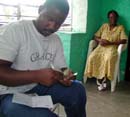Andrew
Maykuth Online
|
 |
Rita Euzebe |
PORT
AU PRINCE, Haiti -- Rita Euzebe anxiously
waited behind the metal security gate of her house Monday afternoon,
scanning the street littered with rubbish and rusty cars.
The man with the money was overdue.
Earlier that day, 1,700 miles to the
north, Euzebe's daughter Maryse Jean-Pierre walked into a shop in West
Philadelphia's vibrant Haitian community and handed $220 over to a clerk
to be wired home.
As storm clouds darkened the sky over
this broken-down Caribbean capital, the courier finally arrived at
Euzebe's door. He pulled out a roll of dollars from his pocket and counted
out eleven $20 bills.
For Euzebe, the tiny stack of bills is a
godsend in a country with a chronically pitiful economy. For economists,
this transaction is part of a vast multibillion-dollar international
financial flow that keeps people alive and sustains Third World economies
through the exporting of cheap labor.
"Our family is large, and this is a
difficult time in Port-au-Prince," said Euzebe, 65. "We need to
buy rice and cooking oil, and the propane for the stove is finished. Some
of our family in the countryside are suffering, and I will send some of
this money to them."
The first $20 bill from Philadelphia
began circulating through Haiti's economy the next morning. Euzebe sent
her brother, Erold, to a crowded store in the neighborhood to bring home
55 pounds of rice and a gallon of corn oil.
Immigrants and migrant workers send more
than $100 billion a year to their home countries, and the total is growing
fast, experts say. In Latin America and the Caribbean, where $38 billion
in remittances originate mostly from the United States, the money sent
home amounts to four times official development aid, according to the U.S.
State Department.
 |
The man from the money remittance agency counts the cash for Rita Euzebe. |
"I don't think you can
underestimate the impact those remittances have on Haiti," said Anne
H. Hastings, director general of Fonkoze, a nonprofit agency that provides
banking services for the poor. "Literally, people are being kept
alive with this money."
Haiti, a nation of eight million people
frequently cited as the poorest in the Western Hemisphere, is considered
the world's most dependent nation on remittances. Haiti receives about
$900 million a year from expatriates sending money home - a quarter of the
nation's GDP.
There are approximately 6,000 immigrants
from Haiti living in the Philadelphia area, mostly in West Philadelphia
and Olney. Northern New Jersey is tied with Massachusetts in having the
third-largest concentration of Haitian immigrants, behind Florida and New
York.
'Very visible'
Immigrants from around the world have
sent money back to their families for generations. But in recent years,
migration has increased and the ability to monitor the financial flows has
improved.
"These flows are now very visible
and recognized by central banks," said Pedro de Vasconcelos, the
remittance coordinator of the Inter-American Development Bank's
Multilateral Investment Fund in Washington.
Big countries such as Mexico and India
receive the largest flows of cash from workers - about $10 billion a year.
But remittances have a greater impact on smaller, more impoverished
countries such as Haiti. Support from migrant laborers is responsible for
more than 10 percent of the gross domestic product of Nicaragua, El
Salvador and Jamaica, according to the International Monetary Fund.
'Dig deep to help'
Haiti is truly one of the world's basket
cases, with practically a subsistence economy. Overpopulated and depleted
of natural resources, its central government in disarray, Haiti exports
little other than its labor. Its trade deficit is $700 million, which
means that much of the money sent home to Haiti goes right back to the
United States to pay for the nation's imports.
"It's poor people sending money to
poor people," said de Vasconcelos. "Without remittances, some
countries would fall apart. Haiti, you can bet on that."
Remittances often help ease nations
through economic emergencies. After Haiti's government fell in February
amid a rebel uprising, cash transfers increased dramatically. When
Argentina's economy collapsed in 2001, Argentine expatriates came to the
rescue.
"In times of crisis, people really
dig deep to help back home," said Kevin O'Neil, a researcher for the
Migration Policy Institute in Washington.
In Port-au-Prince, nearly every block
contains an office of a money-transfer agent, underscoring the central
role remittances play in the economy. So many customers have American
greenbacks that many grocery stores accept foreign currency as readily as
Haitian money.
Most Haitians accept the heartbreaking
reality that their loved ones must go away to find work. "There are
no jobs here and few social institutions that provide for Haitians,"
said Rita Euzebe, the Port-au-Prince woman whose daughter lives in
Philadelphia. "This is sad, but you can't do anything."
In the last decade, three of Euzebe's
five children have migrated to Philadelphia. Maryse Jean-Pierre, at 38 the
eldest daughter, left Haiti in 1994 as a political refugee - the family
are supporters of former President Jean-Bertrand Aristide, who was ousted
in a military coup in the early 1990s.
Jean-Pierre's story is the classic
immigrant's tale of hard work and sacrifice. Barely able to speak English
when she arrived, she first worked as a nanny for Haitian women while she
studied English and computers at Community College of Philadelphia. Within
a year after her arrival, she began sending money back to her family.
Later she found a job as a caseworker
for several social-service agencies, including the Haitian Community
Center. She and the center's director, Frantz Latour, now have two young
children and live in a two-story rowhouse in Upper Darby. Jean-Pierre's
younger sister and a brother, who are students, also share the home.
"Every Haitian in America has
someone to send money to in Haiti," said Jean-Pierre. "If you
don't have a family, you have a close friend who needs help."
Jean-Pierre said she tried to send money
every month, typically about $200 each time. The money comes from her $350
weekly salary.
She also tries to visit Haiti every year
or so, each time cramming her luggage with gifts of hams, diapers and
clothing. When times are very difficult in Haiti, she fills a 55-gallon
cardboard drum with canned food, bags of rice and clothing, and sends it
by a Miami shipper directly to her family in Port-au-Prince.
On Monday morning, while most of her
family was still asleep, Jean-Pierre dressed in a matching shirt and pants
and made her way to the Caribbean Island Shop on 63d Street in West
Philadelphia - about a five-minute drive from her house. The cramped
one-room shop sells Haitian music and provides tax-preparation and
immigration services.
Mario Aleus, a Haitian native who
co-owns the shop, is an agent for the Vigo Remittance Corp., one of the
licensed companies that specializes in cross-border transfers.
Aleus charges her $18 to send the money
to Haiti. Jean-Pierre is sardonic about handing over the cash.
"You see, it's like flushing money
away," she said. "You're sending, and sending and sending,
nonstop. You're just not getting anything back."
Five hours later (2:40 p.m. in
Port-au-Prince), the courier working for the transfer agent in
Port-au-Prince scaled the stone steps outside Euzebe's home in the
neighborhood of Carre Four-Feuille.
Euzebe's rented six-room flat is a
testament to the benefits of remittances. By Haitian standards, she leads
a middle-class life. Euzebe has a stereo, a television and a refrigerator
- though there is no electrical power during the day. She has a wind-up
radio for when there is no power.
"We bought these things with the
money Maryse sent us," said Euzebe.
She tries not to spend all the money at
once. Some is parceled out to relatives according to Maryse's
instructions. A little is hidden away for emergencies.
For Euzebe, the most profitable
investment she made was decades ago, when her children were young. In a
nation with no Social Security system and few pensions, children are
expected to support their family.
"It costs a lot to educate a child
in Haiti," Euzebe said. "You have to work very hard. When I
helped them with their education, I considered it like putting money into
a savings account. My children are my bank account."
Inquirer staff writer Susan Snyder contributed to this article.